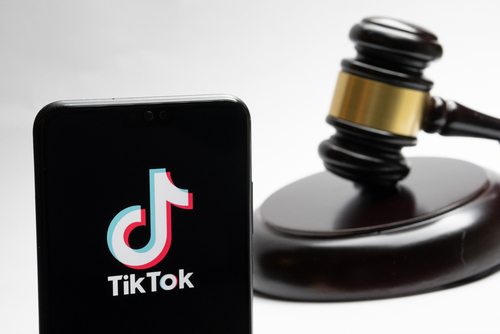Appeals court upholds nationwide TikTok ban-or-sale law

(Images from Shutterstock)
A Washington federal appeals court has turned away a challenge to a fast-approaching nationwide ban of short-video app TikTok unless it divests from Chinese ownership by Jan. 19, affirming the law as constitutional.
The U.S. Court of Appeals for the D.C. Circuit on Friday sided with the Justice Department, which argued that the U.S. government has the authority to ban TikTok based on the national security risk that the wildly popular social media platform could be pressured by the Chinese government to expose Americans’ data or influence what they see. TikTok’s parent, ByteDance, is based in China.
TikTok had argued to the three-judge panel, unsuccessfully, that the ban must be struck down for infringement on the free speech rights of the app’s users and owners under the First Amendment of the Constitution.
“The Government has offered persuasive evidence demonstrating that the Act is narrowly tailored to protect national security,” the court wrote in its opinion.
TikTok is expected to ask the Supreme Court to take up the case before the sale deadline ends next month.
The court also said years-long bipartisan investigations into the app, and the government’s willingness to consider TikTok’s alternatives, weighed in favor of the law.
However, the judges said they rejected the government’s “ambitious argument” that the law did not “implicate the First Amendment at all,” saying that it would impose a “disproportionate burden on TikTok, an entity engaged in expressive activity.” The government had suggested that TikTok’s ownership by a foreign company left it without First Amendment rights, despite it having roughly 170 million U.S. accounts.
The decision sets up a potential showdown with President-elect Donald Trump. Having backed a ban during his first term in the White House, he said on the campaign trail that he would try to “save TikTok,” though many of his choices for key posts in his administration are China hawks who have supported outlawing U.S. access to the platform.
Trump is expected to try to halt the TikTok ban, people familiar with his views on the matter told The Washington Post in early November, speaking on the condition of anonymity to discuss private conversations.
Alan Rozenshtein, a former national security adviser to the Justice Department, said Trump could take any of three actions to help TikTok fend off the ban: persuading Congress to repeal the law, directing his new attorney general not to enforce it, or declaring that ByteDance has satisfied the statute by performing a “qualified divestiture” of TikTok.
The legislation, known as the Protecting Americans from Foreign Adversary Controlled Applications Act, was signed into law by President Joe Biden in April, shortly after it was passed by Congress as part of a sprawling package offering aid to Israel, Ukraine and Taiwan.
The law called TikTok an application controlled by a “foreign adversary” and gave ByteDance roughly nine months to sell the platform to non-Chinese ownership or face a nationwide ban. Finance experts called that time frame almost impossibly short for executing a sale, a complicated transaction that would require regulatory approval in multiple countries. The law gives the president the option to extend the divestment deadline by 90 days if the administration deems the company has made “significant progress” toward a sale.
Further complicating the prospects of a sale, China has said it would block the sale and export of TikTok’s recommendation algorithm, one of the app’s most critical components.
The looming U.S. ban came as a major shock to many of TikTok’s 170 million users in the United States, who have grown accustomed to using the app for daily entertainment or, in some cases, as the chief basis for marketing their small businesses. Since the end of the Cold War decades ago, the U.S. government has rarely invoked national security to impinge on the operation of media platforms.
U.S. officials who backed the ban say that TikTok collects a vast trove of data on its users, ranging from their location to their contact networks and that the company would have limited ability under Chinese law to withhold such data if Beijing officials requested it. TikTok executives argued vehemently that they have firewalled U.S. TikTok user data from the parent company in China, but they failed to convince the U.S. government.
The push to ban the app also came amid the backdrop of a broadly deepening U.S.-China rivalry, with Chinese technology companies facing closer scrutiny in Washington than similar firms based in other countries.
TikTok filed a legal challenge against the Justice Department in May, arguing that the new law violated the First Amendment. A group of TikTok creators followed with their own parallel lawsuit.
The Justice Department and TikTok presented their cases in September in the federal Court of Appeals for the D.C. Circuit before Chief Judge Sri Srinivasan and Judges Neomi Rao and Douglas H. Ginsburg. While Srinivasan noted at the hearing that there would be “serious First Amendment concerns” if such a case involved a purely domestic company, the judges noted that there was legal precedent for national security concerns to override free speech considerations.
The two sides had requested an expedited judgment from the court by early December to allow time for a potential appeal to be filed with the Supreme Court before the Jan. 19 deadline.
In a separate legal case, more than a dozen state attorneys general filed a lawsuit in October accusing TikTok of harming the well-being of children by using addictive product features that keep them hooked on the platform. TikTok said in a statement that it strongly disagreed with the claims.
Aaron Schaffer contributed to this report.


